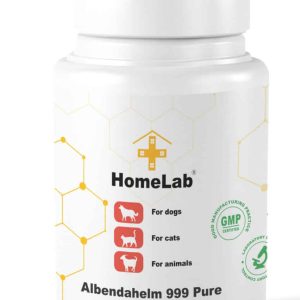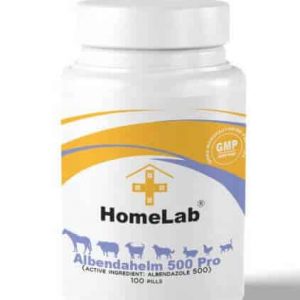Fenbendazole is a broad-spectrum anthelmintic drug that is commonly used to treat parasitic infections in dogs. It is effective against a wide range of internal parasites, including roundworms, hookworms, whipworms, and some types of tapeworms. In this essay, we will discuss the uses, dosage, side effects, and precautions of fenbendazole for dogs.
-
Product on sale
 Pure Albendazole Powder 100gOriginal price was: $105.00.$97.00Current price is: $97.00.
Pure Albendazole Powder 100gOriginal price was: $105.00.$97.00Current price is: $97.00. -
Product on sale
 Fenbendazole Powder 100 percent Pure Dewormer for Dogs 100 gramsOriginal price was: $120.00.$108.00Current price is: $108.00.
Fenbendazole Powder 100 percent Pure Dewormer for Dogs 100 gramsOriginal price was: $120.00.$108.00Current price is: $108.00. -
Product on sale
 Albendazole Tablets Dewormer for Dogs 100 count (Albendahelm 500 Pro)Original price was: $65.00.$55.00Current price is: $55.00.
Albendazole Tablets Dewormer for Dogs 100 count (Albendahelm 500 Pro)Original price was: $65.00.$55.00Current price is: $55.00.
Uses of Fenbendazole for Dogs

Fenbendazole can be used to treat a variety of parasitic infections in dogs. It works by inhibiting the growth and reproduction of parasitic worms, which ultimately leads to their death. The most common types of worms that fenbendazole is effective against are roundworms, hookworms, whipworms, and certain types of tapeworms.
Fenbendazole is also used to treat other types of parasitic infections, such as Giardia and Coccidia. Giardia is a protozoan parasite that can cause diarrhea and other digestive problems in dogs, while Coccidia is a type of microscopic parasite that can cause diarrhea and other gastrointestinal issues.
Dosage Recommendations for Fenbendazole in Dogs

Dosage stipulations of fenbendazole for dogs will vary and factors the weight of the animal and the type of parasitic infection being treated should be considered. Fenbendazole is usually given orally, either in tablet or liquid form. Tablets are available in various strengths, ranging from 22.2 mg to 500 mg, while liquid formulations come in 10% or 100 mg/mL concentrations.
The usual dose of fenbendazole for treating parasitic infections in dogs is 50 mg/kg (22.7 mg/lb) of body weight, given once a day for three consecutive days. This dosing regimen is effective against most types of parasitic infections, including roundworms, hookworms, and whipworms. For tapeworm infections, the dosage may be higher and the duration of treatment may be longer.
It is important to follow the dosage instructions provided by the veterinarian or on the product label. Overdosing can be dangerous and can cause side effects, while underdosing can lead to treatment failure.
Side Effects of Fenbendazole for Dogs
Fenbendazole is generally safe when used according to the prescribed dosage. However, like any medication, it can cause side effects in some dogs. The most common side effects of fenbendazole include vomiting, diarrhea, and loss of appetite. These side effects are usually mild and resolve on their own within a few days.
In rare cases, fenbendazole can cause more serious side effects, such as liver and kidney damage. Dogs with preexisting liver or kidney disease are more susceptible to these side effects and should be monitored closely during treatment.
Precautions for Using Fenbendazole for Dogs
Fenbendazole should not be used in dogs that are allergic to it or its components. It should also be used with caution in dogs with preexisting liver or kidney disease, as well as pregnant or nursing dogs. The drug can cross the placenta and milk barrier and may affect the developing fetus or nursing puppies.
It is important to inform the veterinarian of any other medications or supplements that the dog is taking, as some medications s can interact with fenbendazole and cause adverse reactions.
Fenbendazole should be stored in a cool, dry place, away from sunlight and moisture. It should be kept out of reach of children and pets.
Fenbendazole is effective against several types of worm infections in dogs. Let’s take a look at some common types of worms that fenbendazole can target:
Roundworms
(Toxocara canis, Toxascaris leonina): Roundworms are one of the most common types of intestinal parasites in dogs. They can be transmitted through ingestion of contaminated soil, feces, or prey animals. Fenbendazole effectively kills and eliminates roundworms from the dog’s gastrointestinal tract.
Hookworms
(Ancylostoma caninum, Uncinaria stenocephala): Hookworms are another common type of intestinal parasite that can cause anemia, weight loss, and gastrointestinal disturbances in dogs. Fenbendazole is effective against both adult and larval stages of hookworms, helping to eradicate the infection.
Whipworms
(Trichuris vulpis): Whipworms are intestinal parasites that reside in the cecum and colon of dogs. They can cause chronic diarrhea, weight loss, and general debilitation. Fenbendazole is highly effective against whipworms, eliminating the adult worms and interrupting their life cycle.
Tapeworms
(Dipylidium caninum, Taenia species): Fenbendazole is effective against certain types of tapeworms, such as Dipylidium caninum, which is commonly transmitted through flea infestations. However, it may not be effective against all species of tapeworms. If a dog is diagnosed with a tapeworm infection, the veterinarian may recommend an alternative medication or combination treatment.
Giardia
(Giardia duodenalis): Giardia is a protozoan parasite that can cause diarrhea and gastrointestinal upset in dogs. Fenbendazole is often prescribed as one of the treatment options for Giardia infections. It helps to eliminate the parasite and alleviate the associated symptoms.
Coccidia
(Coccidia species): Coccidia are microscopic parasites that can cause diarrhea, dehydration, and weight loss in dogs. Fenbendazole is effective against certain species of coccidia and is commonly used to treat coccidiosis.
It is important to note that the effectiveness of fenbendazole against different parasites may vary, and it may not be effective against all species or stages of worms. Therefore, it is essential to consult with a veterinarian for an accurate diagnosis and appropriate treatment plan tailored to the specific parasite infection in the dog.
Additionally, regular fecal examinations and deworming schedules are recommended to help prevent and control worm infections in dogs. Deworming protocols may vary based on the dog’s age, lifestyle, and potential exposure to parasites. Consulting with a veterinarian will ensure the most effective and appropriate use of fenbendazole for worm infections in dogs.
Conclusion
Fenbendazole is a highly effective anthelmintic drug that is widely used to treat parasitic infections in dogs. It is safe and easy to use, with few side effects when used according to the prescribed dosage. However, like any medication, it is important to follow the instructions provided by the veterinarian and use fenbendazole as directed.
Regular Deworming
Regular deworming is an essential part of maintaining the health and well-being of dogs, especially those that spend time outdoors or encounter other animals. Parasitic infections can cause a range of symptoms, including gastrointestinal upset, weight loss, poor coat condition, and even more severe complications in severe cases. By using fenbendazole as recommended, dog owners can effectively eliminate and prevent these parasitic infections, promoting the overall health of their pets.
Safety Profile
In addition to its effectiveness against common internal parasites, fenbendazole is also known for its safety profile. It is generally well-tolerated by dogs, and the side effects are usually mild and transient. However, it is important to monitor the dog during treatment and report any concerning symptoms to the veterinarian.
Accurate Dosage
When administering fenbendazole, it is crucial to ensure accurate dosing. The weight of the dog should be determined accurately, and the dosage should be calculated accordingly. Using a kitchen scale or consulting the veterinarian for assistance can help ensure the correct dosage is administered.
It is worth noting that fenbendazole is primarily effective against intestinal parasites and may not be effective against external parasites, such as fleas or ticks. Therefore, additional measures, such as regular flea and tick prevention, may be necessary to provide comprehensive protection against all parasites.
While fenbendazole is generally considered safe, it is always advisable to consult with a veterinarian before starting any medication. They can provide appropriate guidance based on the individual needs of the dog and any specific health considerations. The veterinarian can also help determine the most suitable treatment plan and recommend the necessary follow-up deworming schedule to ensure continued protection.
When used correctly, following the prescribed dosage and under the guidance of a veterinarian, fenbendazole provides a safe and reliable solution for eliminating and preventing parasitic infections in dogs. By prioritizing regular deworming and overall parasite control, dog owners can ensure the long-term health and happiness of their furry companions.
 Total Pooch Dog Supplements, Tear Stain Removers, De-wormers, Tylosin for Dogs and other great products.
Total Pooch Dog Supplements, Tear Stain Removers, De-wormers, Tylosin for Dogs and other great products.





